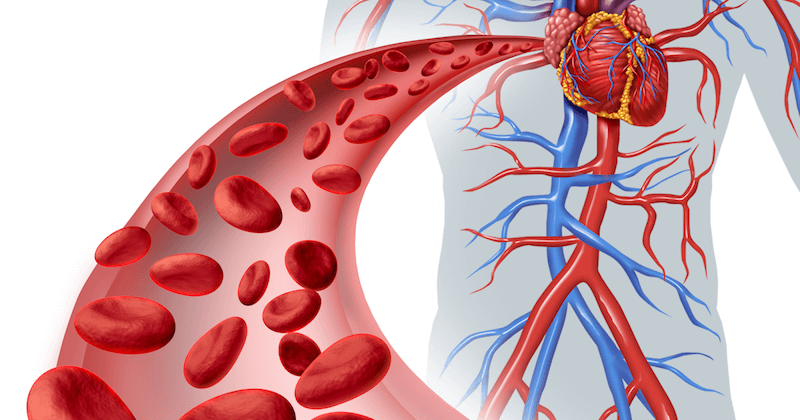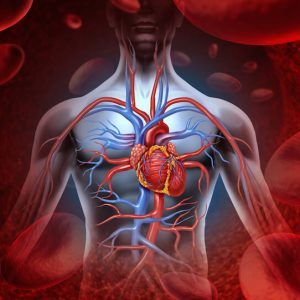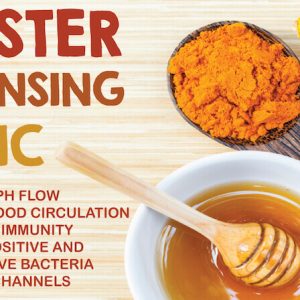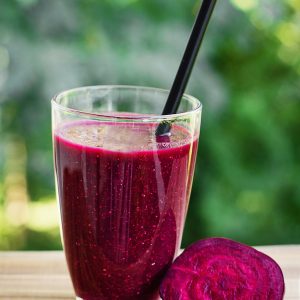Our blood is like the “water” of our body’s rivers. It’s what keeps our immune systems strong and healthy, and heart pumping. It literally gives us life. Without it, we wouldn’t be alive.
As with any river, when water levels decrease, parts of the rivers die, or the life within them simply stops flourishing. You can easily apply this concept to our own bodies. Without ample blood circulation, the tiny capillaries and veins in our body simply don’t get enough blood. As a result, the surrounding cells don’t get the nutrients and oxygen they need.
Poor blood circulation takes a huge toll on our bodies, and there’s a good chance you have it.
15 Warning Signs of Poor Blood Circulation
Most of us lead a sedentary lifestyle, eat foods that we probably shouldn’t be eating, and are regularly stressed out or in a constant state of fatigue. The products we use, air we breathe and lifestyles we lead all contribute to poor blood circulation.
As a result, blood doesn’t flow freely through the body. This is bad news, as it means your organs (including the heart and brain) aren’t receiving the nutrients they need in order to function properly. Your extremities (arms, hands, legs, and feet) are also left out when blood circulation is less than optimal.
Not surprisingly, poor blood circulation can lead to a host of different problems, some of which are potentially life threatening. Here are 15 warning signs of poor blood circulation (1).
1. Numbness in the Limbs
We’ve all felt this sensation before, when a part of our body “falls asleep” due to blood flow being cut off. If these episodes of numbness happen quite frequently, it may be indicative of a more serious circulation problem.
2. Slow Healing Time
If you have poor blood circulation, it’ll be nearly impossible for your body to heal any kind of physical damage. Think of blood like the building blocks of injury repair – if your blood flow is impaired, healing processes will dramatically slow down. This is something most diabetics suffer from, when their blood vessels are damaged by years of elevated blood sugar, resulting in poor blood supply to the limbs.
3. Dry Skin
When your blood circulation is hindered, your skin automatically suffers. Some visible signs of this include skin dryness, decreased skin elasticity and deeper skin wrinkles.
4. Varicose Veins
Poor circulation can cause the veins just under the surface of the skin on your legs to become swollen, twisted and very visible. These lines are also known as varicose veins, and while they can be unsightly, thy can also become itchy or even painful. People have actually used witch hazel to reduce the size and severity of varicose veins. While this is only a temporary bandaid, and not actually helping the root of the condition, it can help for those who are embarrassed by their veins.
5. Reduced Cognitive Ability
Your brain needs a healthy supply of blood in order to function properly. When someone suffers from poor blood circulation, their mental abilities slow down, too. If you have noticed that you’re having difficulty thinking clearly, or your memory isn’t as good as it used to be, this might be a sign that you have poor circulation.
6. Loss of Appetite
While this symptom is less obvious, it is still something to pay attention to. Your gastrointestinal tract needs blood in order to digest food and transport nutrients from the intestine to the rest of the body. If you have poor blood circulation, your digestion can easily become impaired.
7. Cold Extremities
If you have poor blood circulation, you can almost guarantee that your body extremities will be the first to suffer. If your hands, feet, ears and nose are consistently cold throughout the day, you very likely suffer from low blood flow.
8. Constant Sleepiness/Fatigue
Reduced blood flow to the brain will leave you feeling tired and fatigued – even if you’ve just slept for 10 hours straight. You may also feel easily fatigued after doing just a little bit of activity. Physical exercise quickly drains the muscular energy resources, and it is hard for the body to replenish them when circulation is poor.
9. Weakened Immune System
The circulatory system is directly responsible for maintaining a healthy immune system. If your circulation isn’t the best, then the vitamins and minerals your body needs to fight off infection may not be delivered as quickly or in great enough quantities (compared to if your body had a healthy functioning circulatory system). In addition, poor blood circulation contributes to digestive disfunction (mentioned above), which means certain minerals and amino acids that our bodies require in order to synthesize immune-boosting enzymes may be in short supply.
10. Brittle Hair and Nails
Due to a lack of nutrient-filled blood in your body’s extremities, your hair and nails may become weak and brittle. If you notice that your nails are chipping more easily, or that your hair breaks and falls out more frequently than it used to, poor circulation may be the culprit.
11. Digestive Problems
Poor circulation in the digestive tract can hamper your body’s ability to obtain nutrients from food. Without enough blood flow, the foods you eat will pass through your system without being completely digested. This will lead to nausea, loose bowel movements, or other digestive issues that are often misdiagnosed.
12. Dizziness
Dizziness while standing can often be attributed to a sudden drop in blood pressure after a person suddenly stands up after sitting or lying down for awhile. This means that your blood isn’t getting to your brain quickly enough, and therefore leaves us feeling a little dizzy (even to the point of blacking out).
13. Skin Discolouration
When your hands and feet aren’t getting an adequate blood supply, you will probably notice some discolouration of the skin covering these parts of your body. If you see that your extremities look a little blue or purple, you can be certain that your circulatory system isn’t functioning as it should.
14. Low Libido
Poor blood circulation can also caused problems with our reproductive system. Our reproductive organs need a lot of blood to work properly (in both men and women), and when they don’t get enough, they start shutting down. In women, poor blood circulation may result in irregular monthly cycles or fertility problems. In men, they’ll often find that their ability to get erect is nearly impossible. Both men and women may also experience a complete loss of libido as a result of poor circulation.
15. Chest Tightening
When you have poor blood circulation, your heart doesn’t get as much blood flow as it normally would. This can result in a tight feeling in the chest, almost as though there is increased pressure in the chest area. This is called angina. While the pressure and pain will randomly come and go, it is a sure sign that your circulatory system isn’t functioning at its best.
How To Improve Poor Blood Circulation
There are many different ways you can improve poor blood circulation. As with most health ailments, turning to food, herbs and other plants as a means to heal the body is what I most often recommend.
If you want to improve blood circulation, you need to focus on medicinal foods that help foster a strong heart, healthy blood vessels, and blood with an optimal level of thickness. On the flip side, you should also reduce consumption of foods that contribute to poor blood circulation. There are also a few other lifestyle changes you could make to ensure your blood levels are healthy and strong.
Start Consuming More of The Following:
Blood circulation can be improved with the help of some super foods mentioned below.
1. Cold-Pressed Juice
Freshly pressed juice is one of the best ways to improve blood circulation. When made with nutrient-dense greens and root vegetables, juice provide our body with alkalizing minerals and blood-cleansing properties that neutralize free radicals in the body. Juice is a great way to get nutrients to the blood quickly. Green juices and beetroot juices are some of the best to help rejuvenate our blood.
2. Citrus Fruit
Citrus fruit like oranges, limes, lemons and grapefruit are loaded with vitamin C, which act like blood thinners and make capillary walls strong (2). Vitamin C also helps prevent atherosclerosis by strengthening the artery walls through its participation in the synthesis of collagen. It also prevents the undesirable adhesion of white blood cells to damaged arteries (aka. plaque build-up, which is known to be a common cause of poor circulation) (3).
3. Ginger and Garlic
Ginger is a known vasodilator, meaning it helps open up blood vessels and allows more blood to pass through. It is also a wonderful anti-inflammatory, which puts less stress on our cardiovascular system. Garlic on the other hand helps to cleanse the blood, and prevents plaque build-up in the arteries and veins (4).
4. Turmeric
Turmeric contains the active compound, curcumin, which is a natural phenol with powerful vessel-protecting properties. Curcumin has been shown to improve endothelial function by alleviating the damage from free radicals (and helping the blood vessels relax, and therefore letting more blood flow through them) (5).
5. Foods High in Vitamin B3
While many people take aspirin as their daily blood-thinning medication, many people aren’t aware of the more natural and safer alternative – vitamin B3 (niacin)! Within 20-30 minutes after taking niacin (or consuming foods high in niacin), you blood vessels dilate, causing a warming sensation in your body (otherwise known as the ‘niacin flush’). Vitamin B3 is found readily in chia seeds, brown rice, peanuts, sunflower seeds, potatoes, tomatoes and mushrooms.
6. Hot Peppers
Hot peppers like cayenne pepper works wonders for boosting blood circulation and heart health. Cayenne pepper contains the active compound, capsaicin, which helps stimulate the proper flow of blood throughout the body and organs. It also strengthens the arteries and capillaries (6).
7. Hawthorn Extract
Hawthorn extract does a number of good things for our circulatory system. It protects the inner lining of blood vessels, helps them to dilate and relax, strengthens the heart, prevents blood clotting, improves cholesterol levels and even normalizes blood pressure (7). It is also one of the safest plants recommended for cardiovascular support, with no side effects or herb-drug interactions.
Lifestyle Changes To Reverse Poor Blood Circulation
Don’t forget to adopt the following lifestyle changes (if you don’t do them already) to help improve poor blood circulation.
1. Start Drinking More Water
Over 50% of your blood volume is water, so you can only imagine what being dehydrated does to your circulatory system. The more hydrated you are, the better your blood will flow, and the better your circulation will become. Try to aim for at least 3-4 litres of water every day.
2. Consider Adopting A Plant-Based Diet
While not many people are willing to adopt a plant-based diet, it will significantly help improve the health of your heart, and other organs in the body. When done properly, a plant-based diet provides the body with an infusion of minerals, vitamins, crucial phytonutrients and nutraceuticals. As a result, you’ll feel better in your body and have a lowered risk of heart disease, cancer, stroke, diabetes, and so much more.
A plant-based diet has even been branded as the new “heart attack proof diet” – the wonders it does for our cardiovascular system is outstanding!
Even if you can’t eat totally plant-based, make sure a good portion of your diet includes plenty of leafy greens, herbs, vegetables, fruit and plant-based fats.
3. Stop Eating Processed Foods
Overly processed foods like frozen foods and packaged foods should be avoided if you want a healthy circulatory system. Processed foods are loaded with chemicals and artificial foods additives that make the foods palatable. The more processed a food item has become, the less nutrients it will contain. Our bodies don’t need food that don’t have any nutritional value other than calories (I mean, what’s the point?).
Eating a diet that contains a high percentage of processed foods is one of the easiest ways to make yourself sick and diseased. These foods contain high amounts of sodium, fats, sugar and artificial flavours and chemicals, which eventually lead to the contamination of our blood. The more processed foods you eat, the thicker your blood will become, the more acidic it will be, and the poorer your circulation will become.
4. Exercise Regularly
Exercising regularly is important to keep your heart muscles strong. In fact, exercise is one of the only ways to keep your heart functioning well into your old age. Whenever you move, you’re training the muscles that ensure your blood circulation stays healthy.
5. Quit Smoking
Tobacco is terrible for the cardiovascular system. Carbon monoxide from smoking or second-hand smoke damages the layers of cells in our blood vessels that keep blood flowing smoothly. This results in fats and plaque building up and sticking to our vessel walls, therefore slowing the flow of blood, and leading to poor blood circulation.









Interesting, but sadly you’ve left out half of what constitutes our blood circulatory system – it’s not even mentioned once – which is surprising given it’s promenance in our body: the Lymphatic system.
You state in your opening paragraph it’s our blood ‘that keeps our immune systems strong and healthy, and heart pumping’. It’s actually the Lymphatic system that’s responsibility for our immunity (specifically lymphocytes) and for sterilising our blood that leaks from our capillaries and returns it to the heart cleansed, among other things. Not many people realise that 10% of our blood is leaked from the capillaries into our tissues (interstitial space) in a healthy human and the only way i
it’s cleansed and returns to the heart is via the Lymphatics.
Without our superficial Lymphatics and Lymphatic circulation, our blood circulation can’t/won’t work properly. If a person were to have have full Lymphatic failure they would be dead within 48 hours.
Emerging thought among Cardiologists is that the Lymphatic system is actually more important to circulation than the blood Vascular system.
Thank you for your interesting articles on your website
Hey Catherine. I've written many articles on the lymphatic system, and yes, you are correct. The lymphatic system is our immune system. But our blood also plays a part in keeping our immune systems strong. If your blood isn't pumping good, everything else in the body will be off-kilter.